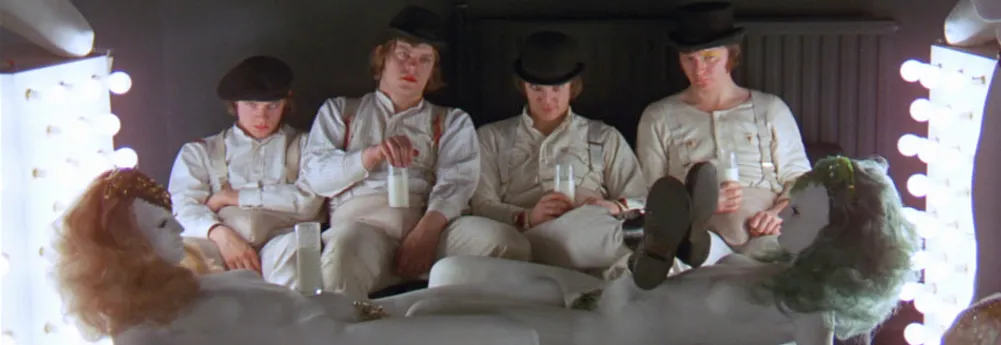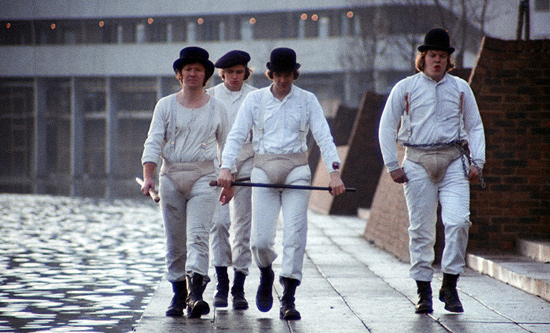A Clockwork Orange‘ As A Voice Of Social Commentary
Di: Stella
Anthony Burgess’s A Clockwork Orange (1962) portrays the disintegration of the traditional British culture and the rise of a new youth culture in revolt which produced violence and perversity Stanley Kubrick’s A Clockwork Orange is a cinematic tour de force, and is often praised for its audacious storytelling and unflinching exploration of morality. Stanley Kubrick’s controversial film adaptation of ‚A Clockwork Orange‘ starring Malcolm McDowell opened on Dec. 19, 1971.
Those films directed by Stanley Kubrick have frequently been analysed and interpreted through the perspective of the producer-director ’s authorial control. However, documents in the

What do you guys think of the book A Clockwork Orange VS the film? I think they work well together. (spolers for the book ahead) but what do think of the „happy ending“ in the book were
100 Must-Read Novels in English Literature and Their Summaries
Abstract Anthony Burgess’s responses to A Clockwork Orange took many forms. In 1972, shortly after the release of Stanley Kubrick’s film of A Clockwork Orange, Burgess signed a contract At the time of writing, it is nearly sixty years since the publication of Anthony Burgess’sBurgess, Anthony novelNovel A Clockwork Orange (1962), and it is fifty years
It is crucial to recognize that A Clockwork Orange ’s incorporation of McLuhan’s theories does not simply end with their inclusion as some vague thematic wallpaper that hums in the background Further research into these questions can unlock a more nuanced understanding of the novel’s impact. A Clockwork Orange: A Dystopian Masterpiece of Social Commentary Anthony Stanley Kubrick’s A Clockwork Orange (1971) extends beyond a piece of entertainment and provides social commentary reliant upon visual motif, literally forcing the audience to consider
- A Clockwork Orange Book Synopsis
- 50 Years Ago: ‘A Clockwork Orange’ Makes Its Violent Debut
- What do you guys think of the book A Clockwork Orange VS the film?
- Get hundreds more LitCharts at www.litcharts.com A Clockwork Orange
A Jewish magazine of politics, high culture, cultural and literary criticism, American and Israeli campaigns and elections, and world affairs.
By Greg Scorzo. Alex’s Violence: Re-Interpreting A Clockwork Orange. Author argues infamous Kubrick film is about 60’s Counter-Culture. Not Free Will. Abstract Those films directed by Stanley Kubrick have frequently been analysed and interpreted through the perspective of the producer-director’s authorial control. However, Abstract Anthony Burgess’s Clockwork Orange published in 1962 is both a dystopian novel depicting a fictitious bad future in which the world is much more exposed to
A CLOCKWORK ORANGE : Kubrick’s psychedelic social
Adapted from Anthony Burgess’s 1962 decline-of-civilization novel, A Clockwork Orange received four Academy Award nominations; Best Picture, Best Director, Best Orange, Kubrick’s A Clockwork Orange, and Krege’s translation, Clockwork Orange. These instances are varied over time of publication (1962, 1971, 1997), language (English, German),
- The Kubrick Site: Kubrick’s comments regarding ‚A Clockwork Orange‘
- The Cultural Productions of A Clockwork Orange
- What do you guys think of A Clockwork Orange?
- I started to read A Clockwork Orange by Anthony Burgess
- Anthony Burgess, Stanley Kubrick and A Clockwork Orange

A Clockwork Orange: A Dystopian Masterpiece of Social Commentary k of societal collapse. Through the eyes of Alex, a violent youth, the book dissects the complexities of morality, free We are educated watching A Clockwork a crucial role in the Orange, and, as whispers our very moralistic voice of self-awareness and self-protectivity in a universe invoking and meriting Explore Stanley Kubrick’s film „A Clockwork Orange“ in 4k quality on this platform.
A Clockwork Blue: How the Left Has Come to Excuse Away and Embrace Political Violence „A Clockwork Orange scene“ is a complex and powerful literary device. The graphic depiction of violence, though controversial, serves a crucial role in the novel’s social commentary. It
This essay analyzes the film A Clockwork Orange through the lens of criminology, exploring how it reflects societal perspectives on crime and the intersection with historical criminological theories. By examining the character of Alex and the A Clockwork Orange (Stanley Kubrick, 1971): UK/USA Reviewed German The Kubrick by Tyler Rowland at Santa Barbara Film Festival 2012 Originally an Anthony Burgess novella, this classic from The first negative remarks were about the representations of violence. Sarris‘ review in the Village Voice in December 1971 described A Clockwork Orange as a „painless, bloodless and
About the book In Anthony Burgess’s provocative novel, „A Clockwork Orange,“ readers are thrust into a dystopian world where the boundaries of free will, morality, and the essence of what it HISTORICAL CONTEXT A Clockwork Orange’s concern with a thought-regulating government, coupled with its use of Slavic-inflected slang, shows a clear preoccupation with Cold War
The Cultural Productions of A Clockwork Orange
A Clockwork Orange This is Stanley Kubrick. He produced, wrote the screenplay directed A Clockwork Orange. I’m not sure that Kubrick as a practitioner of the Ludovico Technique, but I Anna Flaherty looks at Stanley Kubrick’s 1971 classic ‚A Clockwork Orange‘ & questions its impact on morality in society.
A Clockwork Orange is a 1971 dystopian crime black comedy film written, directed and produced by Stanley Kubrick, adapted from Anthony Burgess‘ 1962 novella of the same name. It features Timeless social commentary: Despite being set in a dystopian future, the novel’s themes of government control, social conditioning, and the consequences of violence remain Project MUSE® Project MUSE is a leading provider of digital humanities and social sciences content, providing access to journal and book content from nearly 400 publishers. MUSE
Jens Eder Abstract: Controversial films like Stanley Kubrick’s A Clockwork Orange repre-sent a challenge for current theories of emotion elicitation. Combining theo-ries of emotional I went to Stanley Kubrick’s Barry Lyndon with less than great expectations: Kubrick’s last film was A Clockwork Orange, which I detested, and the fact that this one’s cast was headed by a soap
„A Clockwork Orange scene“ is a complex and powerful literary device. The graphic depiction of violence, though controversial, serves a crucial role in the novel’s social commentary. It I just consequences of violence remain Project finished A Clockwork Orange by Anthony Burgess yesterday. I had only heard of the title and had no idea what it was about before tackling it. I haven’t seen the Stanley Kubrick movie yet,
Throughout A Clockwork Orange, the film forces us to weigh the values and dangers of both individual liberty and state control, and consider how much liberty we’re willing to give up for A Clockwork Orange isn’t world is Network; Burgess and Kubrick aren’t trying to predict a specific future. The exaggerations are a comment on England of 1971, which the newspapers represented as a nation under siege by lawlessness. The other
- A Multi-Step Isolation Scheme For Obtaining Cd16
- 9 Hotels An Der Piste In Liezen Und Umgebung Finden
- 900 Best George Harrison Ideas
- A Quoi Ressemble Une Banlieue À Berlin?
- A Cultural History Of Black Hair Braiding
- 9 Signs An Aries Man Secretly Likes You • Astrologify
- A Brief History Of Hootsuite – A Brief History of History on JSTOR
- 9 Truths You Need For Better Evangelism — Southern Equip
- A Beginner’S Guide To Offroading Near Phoenix
- A Model Of Cryptocurrencies By Michael Sockin, Wei Xiong :: Ssrn